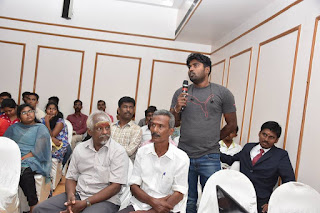 The temple city of Madurai played host to the 3rd seminar of the ‘India at 70’ series by Tamil Nadu Young Thinkers Forum (TNYTF), on October 26, 2017. Organised in association with Saraswathi Narayanan College, the seminar was titled “India at 70: The Significance of Jammu and Kashmir”. October 26 is significant as it is on this date 70 years ago that Maharaja Hari Singh acceded Jammu and Kashmir to the Dominion of India, under a legitimate instrument of accession.
The temple city of Madurai played host to the 3rd seminar of the ‘India at 70’ series by Tamil Nadu Young Thinkers Forum (TNYTF), on October 26, 2017. Organised in association with Saraswathi Narayanan College, the seminar was titled “India at 70: The Significance of Jammu and Kashmir”. October 26 is significant as it is on this date 70 years ago that Maharaja Hari Singh acceded Jammu and Kashmir to the Dominion of India, under a legitimate instrument of accession.The evening opened to a packed audience to be addressed by Major General Shri Dhruv C. Katoch, Director of India Foundation; Senior Journalist and Author, Shri Rahul Pandita; Author, Blogger, Writer and Columnist Ms. Dimple Kaul; and, Senior Research Fellow from India Foundation and Lawyer, Shri Guru Prakash.
Shri Guru Prakash, in his unflinching address, outlined the legal validity of the Agreement of Accession, and its acceptance by world bodies and other countries. Prakash broke down the complexities in Article 370, 35A and the special provisions, for the audience to be able to better understand them. He further explained the need for political will and the larger acceptance of the people of the valley for course correction, and constitutional amendments to turn the wheels around.
The seminar contextualized the spiritual, emotional, linguistic, cultural and historical bonds that bind Jammu and Kashmir with the rest of India. While the state of Jammu and Kashmir has been in conflict for the last three decades, the seminar highlighted that this is but a blip when viewed in the larger historical context. The importance of the state as part of the Indian Union is not just a matter of geography but encompasses the very idea and soul of India.









